Military medical facilities in the service of obstructing justice in war crimes proceedings
 The main trial before the War Crimes Department of the High Court in Belgrade in the Trnje case, which was scheduled for September 13 2017, was not held because the defendant Pavle Gavrilović did not appear before the Court, again, because he allegedly fell ill on the day of the trial. His absence was, as in previous occurrences, justified on the basis of medical records issued by the Military Hospital in Niš. The second defendant, Rajko Kozlina, used to use a similar tactics of absence from the trial, with the only difference that he received confirmation of hospitalization from the Belgrade Military Medical Academy. Both defendants are still members of the Army of the Republic of Serbia. The Humanitarian Law Center (HLC) points out that this is a deliberate obstruction by the defense, with the complicity of military medical institutions, and calls on the court to, by at least placing the defendants in custody, put an end to an obvious obstruction of justice.
The main trial before the War Crimes Department of the High Court in Belgrade in the Trnje case, which was scheduled for September 13 2017, was not held because the defendant Pavle Gavrilović did not appear before the Court, again, because he allegedly fell ill on the day of the trial. His absence was, as in previous occurrences, justified on the basis of medical records issued by the Military Hospital in Niš. The second defendant, Rajko Kozlina, used to use a similar tactics of absence from the trial, with the only difference that he received confirmation of hospitalization from the Belgrade Military Medical Academy. Both defendants are still members of the Army of the Republic of Serbia. The Humanitarian Law Center (HLC) points out that this is a deliberate obstruction by the defense, with the complicity of military medical institutions, and calls on the court to, by at least placing the defendants in custody, put an end to an obvious obstruction of justice.






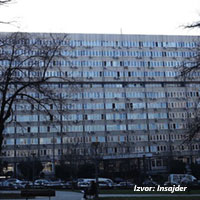
 More than a year after the adoption of the
More than a year after the adoption of the 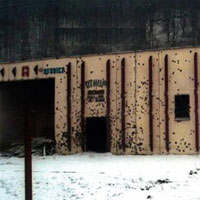


 On June 21st 2017, the Humanitarian Law Center (HLC) filed a criminal complaint with the Office of the War Crimes Prosecutor of the Republic of Serbia (OWCP) against Radojica Božović, a former high-ranking member of the Red Berets, as well as against two other members of this unit, for crimes committed in Doboj (Bosnia and Herzegovina) in the period from May to August 1992.
On June 21st 2017, the Humanitarian Law Center (HLC) filed a criminal complaint with the Office of the War Crimes Prosecutor of the Republic of Serbia (OWCP) against Radojica Božović, a former high-ranking member of the Red Berets, as well as against two other members of this unit, for crimes committed in Doboj (Bosnia and Herzegovina) in the period from May to August 1992.
 The Chief Prosecutor of the International Criminal Tribunal for the former Yugoslavia (ICTY), Serge Brammertz, in his regular six-month address to the UN Security Council on 7 June 2017, presented a report in which he warned of a growing trend of denial and revisionism of court- established facts in Serbia and the entire region, as well as of the burning issue of the slowdown in the process of war crimes trials before Serbian courts, and the difficulties of regional cooperation between specialized prosecution offices. At the same session of the UN Security Council, the Serbian representative Čedomir Backović rejected any words of criticism and opposed Brammertz’s substantive objections by presenting the supposed statistical successes of the Serbian government that he represents. The signatories to this appeal demand that the Serbian authorities consider carefully the objections addressed to Serbia during the UN Security Council session, and deal with problems that have in recent years resulted in the growth of nationalism in society and a drastic deterioration in relations with the countries of the region.
The Chief Prosecutor of the International Criminal Tribunal for the former Yugoslavia (ICTY), Serge Brammertz, in his regular six-month address to the UN Security Council on 7 June 2017, presented a report in which he warned of a growing trend of denial and revisionism of court- established facts in Serbia and the entire region, as well as of the burning issue of the slowdown in the process of war crimes trials before Serbian courts, and the difficulties of regional cooperation between specialized prosecution offices. At the same session of the UN Security Council, the Serbian representative Čedomir Backović rejected any words of criticism and opposed Brammertz’s substantive objections by presenting the supposed statistical successes of the Serbian government that he represents. The signatories to this appeal demand that the Serbian authorities consider carefully the objections addressed to Serbia during the UN Security Council session, and deal with problems that have in recent years resulted in the growth of nationalism in society and a drastic deterioration in relations with the countries of the region.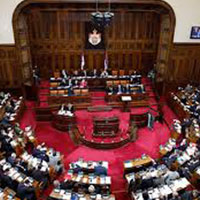
 On Monday, May 15th 2017, the National Assembly of the Republic of Serbia
On Monday, May 15th 2017, the National Assembly of the Republic of Serbia 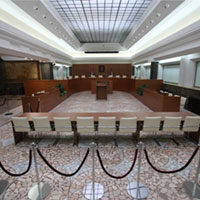
 The Serbian Constitutional Court has adopted a
The Serbian Constitutional Court has adopted a 
 In March 7th and 8th, 2017, the Serbian delegation presented the Third Periodic Report on the Implementation of the International Covenant on Civil and Political Rights before the UN Committee for Human Rights in Geneva. The report contains data on the prosecution of war crimes in Serbia. During the
In March 7th and 8th, 2017, the Serbian delegation presented the Third Periodic Report on the Implementation of the International Covenant on Civil and Political Rights before the UN Committee for Human Rights in Geneva. The report contains data on the prosecution of war crimes in Serbia. During the 
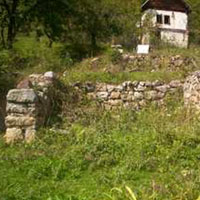
 On February 18th, 2017, it was 24 years since members of the then Yugoslav Army (VJ) attacked and destroyed by shelling the village of Kukurovići in the municipality of Priboj (Serbia), in which the majority of the population were Bosniaks, and killed three villagers. The Humanitarian Law Center (HLC) and the Sandžak Committee for the Protection of Human Rights and Freedoms (Sandžak Committee) use this opportunity to remind the public that even after 24 years, the state of Serbia does not accept responsibility for the crime and refuses to punish the perpetrators and compensate the victims’ families and those residents of Kukurovići whose property was destroyed.
On February 18th, 2017, it was 24 years since members of the then Yugoslav Army (VJ) attacked and destroyed by shelling the village of Kukurovići in the municipality of Priboj (Serbia), in which the majority of the population were Bosniaks, and killed three villagers. The Humanitarian Law Center (HLC) and the Sandžak Committee for the Protection of Human Rights and Freedoms (Sandžak Committee) use this opportunity to remind the public that even after 24 years, the state of Serbia does not accept responsibility for the crime and refuses to punish the perpetrators and compensate the victims’ families and those residents of Kukurovići whose property was destroyed.